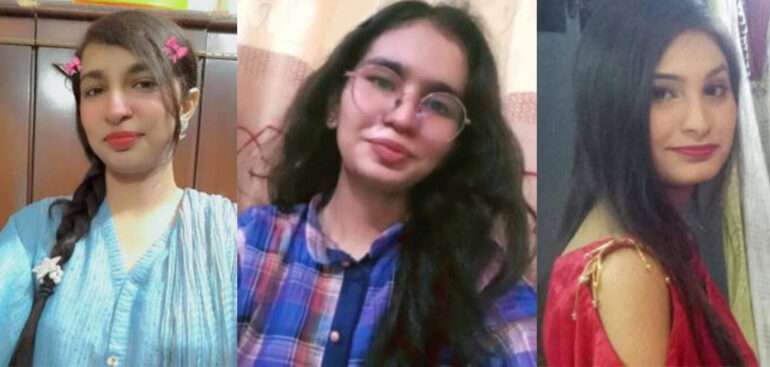In a country that never tires of posturing as a guardian of religious freedom on the world stage, Pakistan continues to fail its most vulnerable with appalling regularity. On June 18, four young members of the Hindu community—Jiya Bai (23), Diya Bai (20), Dashina (15), and Harjeet (13)—were abducted from Shahdadpur in Sindh’s Sanghar district. This heinous crime was not a random act of violence, but yet another chapter in Pakistan’s long, systemic campaign of coercion, intimidation, and forced religious conversion, disguised under the cover of “free will.”
Two of the girls, Jiya and Diya, were later traced to a so-called religious trust in Karachi—Gosha-e-Aafiat—an institution with a reputation that raises more questions than it answers. Although both declared themselves adults in court and stated they had converted voluntarily, the context around their “choice” cannot be ignored. The other two—Dashina (now renamed Sidra) and Harjeet (renamed Abdul Rafay)—are minors. Their conversion and subsequent “testimonies” in court, claiming they changed their faith willingly, were conducted under questionable conditions. The boy later retracted his statement in a video, revealing that the declaration was made at gunpoint. What more proof does the state need to recognize the sheer criminality of what has transpired?
Let’s call this for what it is—not a matter of faith, but a hate crime fueled by bigotry, power, and impunity. That the girls and the boy were taken at gunpoint by men from the Khaskheli clan, driven away in a car, and sheltered in Karachi without parental access is not a tale of religious freedom. It is the story of how Pakistan’s minorities are hunted with impunity, their daughters and sisters stolen, their voices muffled by judicial theater, and their pain trivialized by the state’s silence.
In this case, public outcry and prompt action by the Sindh Human Rights Commission (SHRC) led to the police raid and recovery. Yet, this only happened because the victims belonged to the relatively better-off Dewan-Waniya Hindu community. As activist Fakir Shiva Kacchi rightly points out, if this had been the Kolhi, Bheel, or Meghwar communities—poorer Scheduled Castes of Sindh—the news would not have made it past the police station gate. Their daughters go missing too, but their grief seldom gets a hearing, much less a headline.
The judiciary’s acceptance of so-called voluntary conversions, especially when minors are involved, is an indictment of Pakistan’s legal hypocrisy. The Sindh Marriage Restraint Act explicitly sets the minimum marriage and conversion age at 18. Yet time and again, this law is bypassed under the pretense of “personal choice,” with police and courts complicit in rubber-stamping these conversions, often without verifying the mental state, duress, or psychological manipulation involved. The children, who should be in school, end up in courtrooms surrounded by those very men who abducted them, expected to stand up against their captors with no parental support, no counseling, and no legal aid.
Let us not be fooled by the court statements. When children are taken from their homes at night, isolated from their families, placed in the custody of religious zealots, and then miraculously emerge with new names, new faiths, and rehearsed declarations—it is not religion, it is psychological captivity.
According to Human Rights Commission of Pakistan (HRCP) and multiple UN reports, Pakistan witnesses an estimated 500–1,000 forced conversions of Hindu and Christian girls annually, most of them from Sindh. Yet not one significant conviction. Why? Because the state’s institutions, from police to the judiciary, continue to side with the perpetrators under the garb of “Islamic duty” or social appeasement.
The Pakistani state is not just negligent; it is complicit. Its refusal to pass meaningful legislation against forced conversions, its failure to set up oversight for religious institutions, and its inaction even in the face of international condemnation make it clear: the suffering of minorities in Pakistan is not a glitch; it is a policy failure woven into the fabric of its governance.
The boy’s heartbreaking confession after his “return” should be enough to shake any moral conscience. But in Pakistan, the cries of minorities fall silent under the roar of majoritarian impunity. When will Pakistan stop legitimizing the kidnapping of children under the guise of conversion? When will it stop using religion as a tool to erase its minorities?
Until that day, every abduction like this is not just a crime—it is a state-sanctioned violation of humanity itself. And the world must stop looking away.
